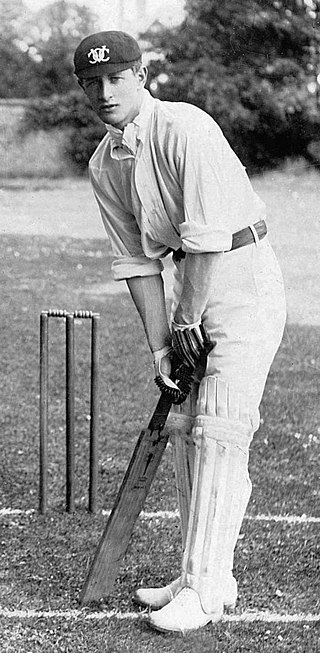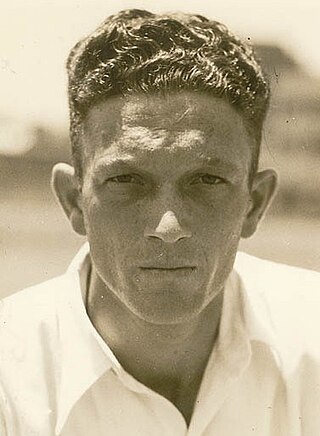Related Research Articles

The wicket-keeper in the sport of cricket is the player on the fielding side who stands behind the wicket or stumps being watchful of the batsman and ready to take a catch, stump the batsman out and run out a batsman when occasion arises. The wicket-keeper is the only member of the fielding side permitted to wear gloves and external leg guards. The role of the keeper is governed by Law 27 and of the Laws of Cricket.

Ronald Arthur Saggers was an Australian cricketer who played for New South Wales. He played briefly for the Australian team, playing six Tests between 1948 and 1950. In his Test cricket career he made 24 dismissals and scored 30 runs at an average of 10.00.

Robert William Taylor MBE is an English former cricketer who played as wicket-keeper for Derbyshire between 1961 and 1984 and for England between 1971 and 1984. He made 57 Test, and 639 first-class cricket appearances in total, taking 1,473 catches. The 2,069 victims across his entire career is the most of any wicket-keeper in first-class history. He is considered one of the world's most accomplished wicket-keepers. He made his first-class debut for Minor Counties against South Africa in 1960, having made his Staffordshire debut in 1958. He became Derbyshire's first choice wicket-keeper when George Dawkes sustained a career-ending injury. His final First Class appearance was at the Scarborough Festival in 1988. He remained first choice until his retirement except for a short period in 1964 when Laurie Johnson was tried as a batsman-wicketkeeper.
Thomas Straw was an English first-class cricketer. A right-handed batsman born in Hucknall Torkard, Nottinghamshire, he kept wicket for Worcestershire County Cricket Club in their early years of first-class cricket. He was a poor batsman, with a top score of just 32 in his 94 innings, and went in at or near the bottom of the order.
David James Pipe is a former English first-class cricketer, who played as a wicket-keeper.
Cecil Brabazon Ponsonby was an English first-class cricketer: a right-handed batsman and wicket-keeper who played 74 times for Worcestershire between 1911 and 1928, captaining the county in 1927; he also made a single appearance each for Marylebone Cricket Club (MCC) and HK Foster's XI.
Roy Booth was an English first-class cricketer, who played for both Yorkshire and Worcestershire. He was born at Marsden, West Riding of Yorkshire.

Geoffrey Norman Foster was an English first-class cricketer who played for Worcestershire and Kent County Cricket Clubs, as well as appearing a number of times for Oxford University and MCC. He was one of the seven Foster brothers, all of whom played first-class cricket for Worcestershire, and he led the county on a few occasions in the absence of the regular captain. He was a fast scorer, once making 101 in an hour for Oxford against Gentlemen of England.
Paul Bernard Fisher is an English educationalist, who served as headmaster of Loughborough Grammar School between 1998 and 2016, and who previously played first-class cricket for Middlesex, Worcestershire and Oxford University. As a cricketer, he was very much a specialist wicket-keeper, with a batting average in single figures in both forms of the game.
Henry Yarnold, known as Hugo Yarnold, was an English first-class cricketer who became a Test match umpire. He was born at Worcester in 1917.
Edward William John Brooks was an English cricketer. A wicket-keeper, he played first-class cricket for Surrey from 1925 to 1939, all but five of his first-class appearances being for the county. Only Herbert Strudwick has exceeded his 810 dismissals for the county.
John Colin Scholey is a former English first-class cricketer who played ten matches for Worcestershire as a wicket-keeper in the early 1950s.
Philip John Whitcombe is a former English first-class cricketer who played 34 matches between 1949 and 1953. 26 of these were for Oxford University, and eight for Worcestershire. He was a wicket-keeper, though he did play in some games as a batsman only.
Walter Herbert Livsey was an English first-class cricketer for Hampshire from 1913 until 1929. A wicket-keeper, Livsey played 320 matches and was considered one of the greatest keepers of the 1920s with 649 dismissals. He was also a tidy keeper, allowing only three byes during Oxford's 554–run innings in his first match. For this success he became Hampshire's regular keeper, and performed a noted stumping of Jack Hobbs in 1914. He fought during World War I, and was demobilised for the 1920 season. He continued at Hampshire until 1929, when his health forced him into retirement.

He worked in his father’s business Stanley of Colmore Row but played county cricket for Worcestershire 1933 and 34 and Rugby for the West Midlands.
George Rodney Cass was an English cricketer: a wicket-keeper who played first-class cricket for Essex and Worcestershire in England, and for Tasmania in Australia, in the 1960s and 1970s. He was capped by Worcestershire in 1970. He was born at Overton, Wakefield, Yorkshire, and educated at Dewsbury Technical College.

Don Tallon was a key member of Donald Bradman's famous Australian cricket team tour of England in 1948, in which Australia was undefeated in their 34 matches. This unprecedented feat by a Test side touring England earned them the sobriquet The Invincibles.
Leo Harrison was an English first-class cricketer who played for Hampshire from 1939 to 1966. Harrison played in 396 first-class matches, 387 of which were for Hampshire. During his career Harrison made 8,854 runs at an average of 17.49 and took 578 catches and 103 stumpings.

In cricket, a hat-trick occurs when a bowler takes three wickets. The deliveries may be interrupted by an over bowled by another bowler from the other end of the pitch or the other team's innings, but must be three consecutive deliveries by the individual bowler in the same match. Only wickets attributed to the bowler count towards a hat-trick; run outs do not count, although they can contribute towards a so-called team hat-trick, which is ostensibly a normal hat-trick except that the three successive deliveries can be wickets from any bowler in the team and with any mode of dismissal.
Alan William Mansell was an English cricketer. Mansell was a right-handed batsman who fielded as a wicket-keeper. He was born at Redhill, Surrey.
References
- Gordon Wilcock at CricketArchive (subscription required)
- Gordon Wilcock at ESPNcricinfo